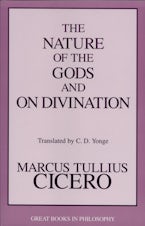
The Nature of the Gods and on Divination
Published by: Globe Pequot
Sales Date: 12/01/1997
263 Pages, 6.00 x 9.00 x 0.50 in
Other Retailers:

Published by: Globe Pequot
Sales Date: 12/01/1997
263 Pages, 6.00 x 9.00 x 0.50 in
Other Retailers: